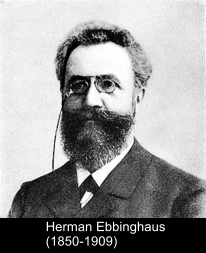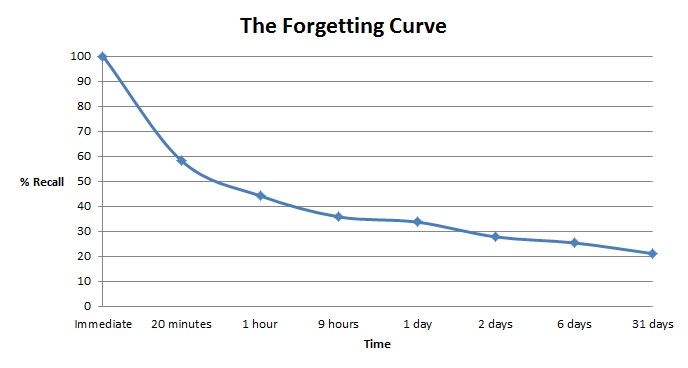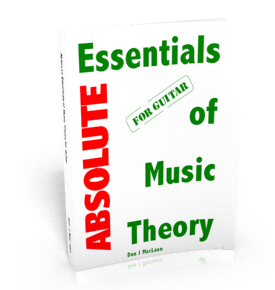Introduction
It’s a common scenario I see all the time with guitar students. You really want to learn to play guitar, but the problem is you don’t have much time for practice.
Everyone knows there is no magic bullet to learning the guitar if you don’t practice.
When you don’t practice often, it becomes much more challenging to remember things.
What Can You Do?
When you are short on time you need to get the most you can out of every guitar practice session, or it will take way too long to learn guitar. One of the keys to this is understanding how we forget things.
To understand the basics of how we forget, we need to go back in time to 1885, when Herman von Ebbinghaus performed his ground breaking research on memory. One of the big takeaways from his experiments is the fo rgetting curve.
rgetting curve.
The forgetting curve simply describes how we forget things over time.
Using himself as the test subject, Ebbinghaus, found that right after we learn something, we know it at 100%. So if we try to recall something immediately after learning it, we will recall 100%. Unfortunately, it doesn’t take very long for us to begin to forget.
After 20 minutes only 58% could be accurately recalled. After an hour 44% could be recalled. After one day only 34% could be remembered. In other words, after just one day, 66% was forgotten. After 31 days only 21% was remembered, or 79% was forgotten.
 Now before you get too depressed about this, bear in mind that our memory system seems to be designed so that we do forget most things.
Now before you get too depressed about this, bear in mind that our memory system seems to be designed so that we do forget most things.
Imagine not being able to forget. You remember the license plate of the car that cut you off 10 years ago. You remember details of unimportant conversations you had as a child. You remember everything that happened in the terrible movie you watched.
There actually have been cases of people that can’t forget. A famous example was a journalist known as “S” that had to quit his job because just about everything distracted him.
When I was at York University doing my degree in music, one of my composition professors told me of student he had at Yale University. She handed in a new composition for an assignment. The problem was that it appeared that there was nothing new in the composition. In fact, it appeared that sections had been lifted from other composers. At first it was thought to be outright plagiarism, but later, it was found to be something much more interesting. They discovered that she had an almost perfect musical memory. She could remember any music she had ever heard—even if she had only heard a piece once. This obviously made it impossible to be a composer. The good news is she was able to put her memory to great use as a performer.
Every day we are bombarded with all sorts of stimuli that the brain has to process on different levels.
By only accessing something just once, you are in essence telling your brain that this info is not really important and so the memory of this fades over time.
If you learn something new and start to use it frequently, you are telling your brain: “hey, this is important!” and so your brain strengthens the pathways for this memory. This makes the memory easier to recall. It’s sort of like having a massive library. The books you use the most would be the ones on the table ready for easy access. The ones you don’t use very often are filed away in deeper sections of the library—so they take longer to access.
How to Reshape the Forgetting Curve
The good news is you can reshape the forgetting curve. Here’s what you need to do:
When you learn something like a new song, chord, scale fingering, or some music theory, within 24 hours of learning this new thing, set aside some time for a quick review. This will help you return your memory to 100%.
Seven days later, do a quick review of it again to top up the memory.
At 30 days, do a quick review again.
When you do this simple technique, you will be surprised by how much better things will stick in your memory.
When you perform these quick review sessions, obviously the best way to do them is with your guitar in hand. But, when you are short on time this is not always possible. When you don’t have access to your guitar, you can still mentally rehearse the material you want to retain in your memory.
In your mind’s eye see yourself performing the new thing. Aim to see it as if it was a video of you performing.
Include the soundtrack as well. Mentally hear the sound of the notes as your mental image plays. By the way, mental rehearsal has been shown in research studies to be very effective at improving guitar playing skills.
Now of course, if you are able to practice a few times a week, you will remember things even better.
The main point here is that you can’t expect to learn something only once and have it stick in your memory forever. If you want it to stick you need to make it stick.
This technique works really well for learning guitar music theory. Let’s say you have just learned the formulas for constructing the most common triads:
Major 1-3-5
Minor 1-b3-5
Diminished 1-b3-b5
Augmented 1-3-#5
Within 24 hours of learning this you would perform a quick review by saying the formulas a few times out loud. After 7 days and after 30 days, you also do quick review sessions.
So there you go, you now know an accelerated guitar learning technique that will help you to learn the guitar much faster—even when you are short on time.
The formula for reshaping the forgetting curve is:
24-7-30
Have fun applying this simple technique. Keep in mind that you can also use this for anything you want to remember at work or school.
Recommended Resource
Are you ready to get your hands on a proven, fast and easy way to learn the basics of music theory for guitar? The Absolute Essentials of Music Theory for Guitar lays out what you need to know about guitar music theory so it’s crystal-clear. You will learn guitar music theory fast with the accelerated learning techniques used in this course.
This will open up a whole new world for you. You will learn guitar faster and feel and hear big improvements in your guitar playing.
Get started now and take the mystery out of music theory so you can learn guitar faster…




